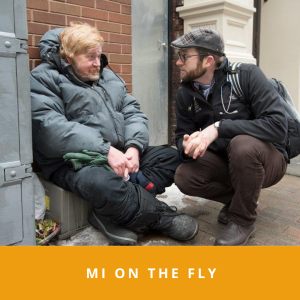MI On the Fly
 About this Training:
About this Training:
Motivational Interviewing (MI) grew out of the work associated first with addiction support and recovery and has since been established as a best practice related to all aspects of work associated with anyone in a position of considering a change in their lives. MI has been noted as effective in the homeless-serving sector, including assisting those with the highest levels of complex needs. This includes the support of youth. See the link to a video providing additional context. https://invisiblepeople.tv/ken-kraybill-on-motivat…
MI training with the TTA, which also includes content regarding the understanding and practical use of the Transtheoretical Model of Change (Stages of Change), has been adapted specifically for those working with complex and marginalized individuals, particularly those experiencing homelessness because of the unique nature of the working environment. These practitioners are not working with 50–60-minute planned sessions in an office. Instead, they are supporting people on the street, in parks, in apartments, and possibly under bridges. Therefore, the TTA MI training (MI On the Fly) provides added context to the use of the skills and adaptations for that type of working environment. Generally, MI also requires those you are working with to have some level of abstract thinking ability. Because many experiencing homelessness suffer from cognitive and developmental challenges, and because many youth vary in both levels, this training also gives participants some additional understanding and adaptations for using MI in these situations.
| Instructor Led (In-person and virtual options) |
|
Training Audience: This training is appropriate for:
Note – The TTA requests that all training include at a minimum, one member of leadership from each organization/agency represented, be present as a learner. |
|
Training Length: In-Person: 1 full day (7.5 hrs) |
|
Training Capacity: In-Person: 30 maximum / 8 Minimum |
|
Training Objectives: Attendees will:
|
|
Training Features: In-Person:
Virtual:
Both:
MI On the Fly as Part of Assertive Engagement Training: (Go here for more information) |
|
Training Prerequisite Onboarding Modules Mandatory: None |
|
Certificate of Completion Through the TTA LMS, attendees will have the ability to receive a certificate of completion of the training by:
Once the assessment is passed, a link will appear allowing the certificate to be downloaded. |
|
Training Costs: Please inquire using the “Request More Info” button to the right regarding fee. Please note that all fees quoted should be considered an “all-inclusive” cost which means there would be not additionl costs for travel, prep, admin, or other items added to the rate provided to you with the exception of provincial tax. Members: A system, community, or organization can become a “Member” by purchasing an annual subscription to self-paced online onboarding modules. Discounts on live training are available determined by the subscription package chosen. (See “Onboarding Module” section here). |
This training will expose attendees, if they have not been already, to the model and benefits of the Transtheoretical Model of Change or “Stages of Change” and how that model acts as the foundation of MI but also how MI can be helpful in supporting individuals move through the stages. Trainees will experience a very interactive full day which will include practical exercises which help them to learn and solidify the skills and concepts associated with effective MI practice, particularly in the fast-paced, unpredictable environment of working with individuals with complex challenges who are experiencing homelessness.
“I would like to express my satisfaction with the Canadian Alliance To End Homelessness (CAEH) partnership and collaboration to bring a first time pilot collaboration to our community in training Motivational Interviewing (MI) trainers for our homeless serving funded agencies.
Valuable support, direction, assistance, resources and techniques have been provided and shared for our trainees to continue the legacy of motivational interviewing lessons and practices.
A vast majority of employees with our funded agencies have been trained by our MI trainers and we are launching into a new year of training, looking to having new staff trained in the principles and practices of MI.
Both fulfilling and rewarding the collaborative pilot project has been a success as motivational interviewing lessons and practices can be applied throughout life. MI has lasting impacts on both my personal and professional life and through my experience can be utilized under any circumstances.” – Cheryl Cooper, Regional Municipality of Wood Buffalo (Fort McMurray, AB)
